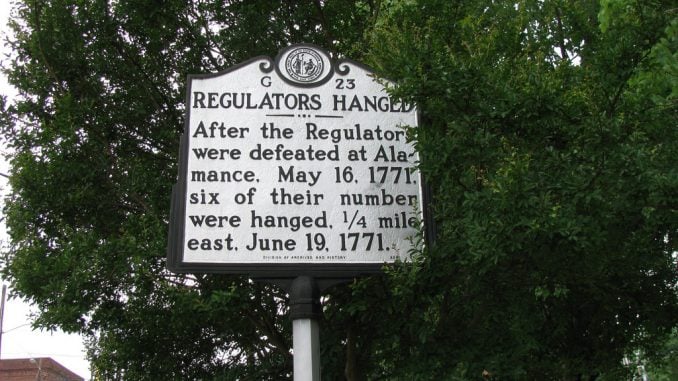
To lead into the tale of the forgotten rebellion, first let me share the story of one of only two C grades I received in college.It was my second semester in Chapel Hill when I enrolled in the American Lit survey course, covering everything from pre-Columbian Indian literature to Tennessee Williams. The course was taught by a graduate student who, we quickly found out, had no background in North Carolina nor any desire to learn about the Old North State. Like a Pat Conroy novel, she thought she was there to bring civilization and probably shoes and dentistry to us backwater folk. Unlike a Pat Conroy novel, I don’t think she allowed herself to learn a thing from us in the process.Her arrogance and ignorance were annoying, and it also affected the quality of her teaching. She had no idea, for instance, why Langston Hughes wrote the line “Way Down South in Dixie” as a refrain in his poem “For a Dark Girl.” This led to a humorous if uncomfortable episode when she asked the class why Hughes repeated that line at the start of each stanza. The answer being so obvious, the class thought her question was rhetorical. It was not. When someone finally mentioned the allusion to “Dixie,” she was genuinely surprised by the connection.My tipping point came early in the semester, when we were shifting from Hawthorne and Paine to other authors after the birth of the Republic. “We’ve been focusing on Northern writers so far,” she told us, “since the Revolutionary War was fought in the North.”Oh, my. Oh, no.It’s often said by those who know their history a little better that the Revolutionary War was started in the North and won in the South. There is much truth to that, owing mostly to the British Southern strategy, rather than to any regional differences in ability to vanquish the imperial troops of George III. But as we remember the birth of our nation this year, we shouldn’t forget the importance of the revolutionary fervor right here in North Carolina, and the failed rebellion that predated the successful one of 1776-1781.Two and one-half years before the Boston Tea Party, armed men of the backwoods of North Carolina were in open rebellion against the Crown for unfair taxation, corrupt royal officials, and other grievances. The 1764-1771 Regulator Movement, as it is known, is still taught to North Carolina schoolchildren, but is largely unknown outside the state.The Regulators are overshadowed for a few reasons. One is that it happened in the sparsely populated interior rather than in a large city, and the movement had no flowery-penned advocates on par with Paine, Franklin, or Jefferson. Another is that it predated the famous Committees of Correspondence, which wouldn’t be formed until 1772 and did not really become effective until 1773. The Committees of Correspondence, a system perfect for spreading (and embellishing) accounts of royal misdeeds, would have leaped at the chance to tell the tale of the Regulators. But that was in the future.Perhaps the biggest reason the Regulators remain unknown today, though, is that they lost and they lost to locally recruited militia, not lobsterbacks from Britain. Unlike the Boston Massacre’s protest-turned-massacre allure or the Tea Party’s political theater, in May 1771 the Regulators found themselves actually in the arena, facing the militia in what is now Alamance County.When Gov. William Tryon called on the rebels to disarm or he would order the militia to fire, the Regulators responded that it should “Fire or be damned!” Fire they did, and the militia earned a quick victory over the rebels at the Battle of Alamance.It’s easy to see how all this could be one uninterrupted story: rise of the Sons of Liberty (North) and Regulators (South), 1764-65; Boston Massacre, 1770; Battle of Alamance, 1771; Boston Tea Party, 1773; First Continental Congress, 1774; battles of Lexington and Concord, 1775; Declaration of Independence, 1776.But that’s not how it is remembered. Some of that is due to the reasons above, but some is surely due to regional arrogance. Can anyone imagine the Battle of Alamance being forgotten if it had happened in Virginia or Massachusetts? Alas, our humble vale has veiled an important part of the patriot story, so this year let us remember the forgotten Regulators and their small part in the independence movement.
Drew Elliot is a member of the North State Journal’s editorial board, separate from the news staff. Unlike other newspapers, the North State Journal does not publish unsigned editorials; the author or authors of every editorial, letter, op-ed, and column is prominently displayed. To submit a letter or op-ed, see our submission guidelines.



